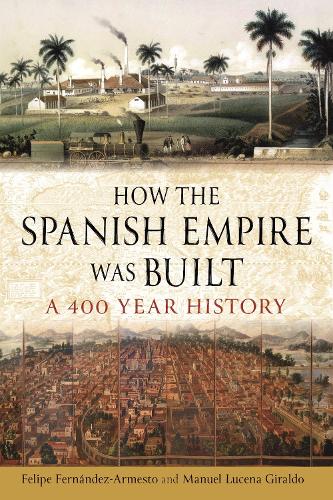
How the Spanish Empire Was Built: A 400 Year History
(Hardback)
Publishing Details
How the Spanish Empire Was Built: A 400 Year History
By (Author) Felipe Fernndez-Armesto
By (author) Manuel Lucena Giraldo
Reaktion Books
Reaktion Books
1st May 2024
1st February 2024
United Kingdom
Classifications
Physical Properties
Hardback
352
Width 156mm, Height 234mm
Description
'Sixteenth-century Spain was small, poor, disunited and sparsely populated. Yet the Spaniards and their allies built the largest empire the world had ever seen. How did they achieve this Felipe Fernandez-Armesto and Manuel Lucena Giraldo argue that Spain's engineers were critical to this venture. The Spanish invested in infrastructure to the advantage of local power brokers, enhancing the abilities of incumbent elites to grow wealthy on trade, and widening the arc of Spanish influence. Bringing to life stories of engineers, prospectors, soldiers and priests, the authors paint a vivid portrait of Spanish America in the age of conquest. This is a dazzling new history of the Spanish Empire, and a new understanding of empire itself, as a venture marked as much by collaboration as oppression.'
Reviews
"'What have the Spaniards ever done for us' imperial subjects may have asked, plotting rebellion. 'Aqueducts' One may have ventured. 'Okay, aqueducts. What else' 'Appeals courts' 'Right! Appeals courts. And' 'Well, the mails' 'Okay. So there are the aqueducts, the appeals courts, the royal mail. But really, what have the Spaniards ever done for us' 'Hospitals' 'The transoceanic fleet system' 'Defensive fortifications' 'Arched bridges' 'A standardized writing system' One gets the idea. Certain to spark heated discussions like this one, How the Spanish Empire was Built offers a comprehensive defense of Spanish logistical ingenuity, a neo-Roman project of truly global dimensions. Known mostly to Spanish historians of science and engineering until now, the logistical stuff of empire, what made it function day-by-day for so long despite the tyranny of distance, the temptations of corruption, and the relentless downward tug of entropy, has remained obscure to most Anglophone readers. In an age obsessed with global supply chains, instant communications, and global epidemics, there is much to be learned from predecessors who first encircled the world, for better or worse. The authors say this is simply a book about the 'scaffolding of empire, ' but it is about much more. It is a provocation."--Kris Lane, Tulane University
Author Bio
Manuel Lucena Giraldo is a Research Scientist at the Spanish National Research Council and Adjunct Professor at IE University and ESCP Business School Europe. His books include Firsting in the Early Modern Atlantic World (2020). Felipe Fernndez-Armesto is William P. Reynolds Professor of History at the University of Notre Dame and an award-winning scholar and historian. His books include Straits (2021).
